Made By Hand
This one's for F.
The closet is cluttered. But I have an essay to write. I peck out a sentence, change a few words, then delete it. I do the same thing a second time. I check email. Then glance at my phone. And suddenly I’m shopping for “the amazing eye cream that’s finally back in stock.” I force myself back to the essay. But how can I write when the eye cream may go out of stock again?
And besides, the closet is cluttered. I close the laptop and head out to the hallway.
Much of what’s in there isn’t ours (it’s a communal closet we share with our neighbors) but some is. More than I realized. There’s a box of Halloween stuff for decorating with our neighbors’ kids. That stays. Under that box is one I semi-recognize - a big translucent plastic tub filled with colorful shapes that feel slightly familiar, like blurry faces in an old photo.
I drag it to our apartment, open it, and feel a rush of joy. We’d wondered what we’d done with Ava’s Barbies. I wanted to think we had them stored neatly somewhere, tucked into their patent leather Dream House. But no. I smile at a tangle of yellow hair, naked limbs, and glittery fabric.
I pluck a green floral taffeta gown between my fingers. It’s the one Barbie wore when Ava brought her to the first day of Pre-K, having been told it was okay to bring “comfort toys.” When I suggested that she might want something softer and more huggable, she looked up earnestly and said, “But I love Barbie.”
Who could blame her? I love Barbie too.
The taffeta between my fingers is stiff, but it’s becoming clear that it’s also something else. Smelly.
I take a good whiff and realize that my hand is filled with a crunchy concoction of glittery mildew. I look more closely and gasp. One Barbie is covered in splotches of decay, her face and gown splattered as if she’d crawled through mud to get to the prom. I notice the tiny braids that frame her face, and feel sad that I can’t remember whether it was me or our nanny Thelma who helped Ava make them. Her arm is raised, as if to wave, or perhaps to say, “Hey. Do something! We’re rotting here!” The scene is so wonderfully morbid that I can’t help but want to write Greta Gerwig about a Halloween spinoff.
Ken is faring no better, although he’s managed to strike a shirtless pose that’s part heroic, part dance-move. Either way, he tries, in his sateen trousers, to look cool, and there’s something touching about his optimism.
Without mold, he’d be a ten.
Wincingly, I poke around. The Barbies, despite their mildew, try to maintain an air of dignity; one nude one, in particular, who wears a triple-strand of pearls and crosses her legs at the ankles.
My eye is caught by what lies beneath Naked Barbie, though. It looks entirely rotted, and stirringly familiar. I shove Naked over and there he is. Sailor Boy. My first true love. My grandparents had brought him back from a cruise when I was four, and I’d promptly fallen for him. His puffy hat reminded me of the Pillsbury Doughboy’s, but Sailor Boy’s was more manly, roguish, even, when I flopped it to the side and let it fall (dangerously!) onto his forehead. His blue eyes opened and closed when he was tilted from a horizontal to a vertical position. I found his buck teeth charming, although I didn’t know that word yet. To see him now all but breaks my heart. My Sailor Boy is rotten, through and through. In fact, I’d wager that whatever moisture got into this tub was absorbed and spread by him. A bad apple. And I’d thought he was so sweet. Even then, I was lousy at assessing boyfriends.
Nevertheless, I fix my superspreader bad-boy with one last adoring gaze, and with a sigh, pull the garbage bin out. I watch as the Barbies tumble in, one decayed beauty on top of another, and my eye is caught by something pink that falls onto the pile. I hold my breath and pluck it out. I recognize it instantly. A sweater my mother knitted. I scan the Charles Manson scene, and pluck a matching pair of shorts.
Suddenly, more knitted pieces become apparent, scattered amongst the debris; like when you notice a water tower in New York, then realize they’re everywhere. A white cardigan with pink boucle trim stares up at me. A purple pencil skirt. And a gold strapless dress with a dark green belt; Ava’s favorite
.The knitted pieces aren’t covered in the moldy splotches that adorn the Barbies and my ex, but they certainly reek. I fill a bowl with water and white vinegar and throw them in, then sadly, drag the bag of stinky Barbies to the basement.
As they soak, I think of the way my mother had given the outfits to Ava, saying “These may not be as exciting as the fancy ones, but I made them and thought you might…” I was prepared to step in and say how beautiful they were but I didn’t need to. Ava’s face lit up and she gasped an “Oh Grandma!” that made my mother smile and me proud of my little girl. She loved Barbie’s shiny, sequined ruffled gowns, but she knew beauty when she saw it.
I fish the pieces from the bowl, and their smell still makes me draw my face back in disgust. I squeeze them out and throw them into a fresh batch of the vinegar mixture. The sweaters and dresses float and I think of the red shift my mother had sewn for my Barbie. I loved its bell sleeves and was fascinated by the sewn-in seams that pointed toward Barbie’s perfect bustline.
“What are these?” I asked.
“Oh. Those are darts,” my mother said. “To give the dress the right shape. Near her bosom.” I didn’t fully understand, but found this talk of bosoms and darts excitingly grown-up and womanly.
My mother was always making things. The night before my 11th birthday party, as we finished the dishes, she announced that she was going to make her own pizza. I was horrified. Birthday parties, in the early 70’s, in the suburbs of New Jersey, were all about pizza, but the kind that came out of a white box; not the kind your mother made from a kit.
“Why can’t we just order one?” I sputtered. “They’ll think I’m a loser.” There was the slightest flicker of hurt in her eyes, but I didn’t care. “And why can’t I ever have a real cake? Like, from a bakery?” I continued. “Audrey had a huge one. She said it was called a sheet cake.”
My mother turned toward the kitchen sink and tightened a faucet that wasn’t dripping. “I guess we could get an ice cream cake,” she said, so softly it hurt.
I knew the chocolate leaves were in the freezer, ready for the top of the cake. I had helped her make them. We’d washed leaves that we’d snipped from a rose bush in our yard. As we patted them dry, she said, as she always did, that the small ones were prettiest. We spooned melted dark chocolate onto them, licking our fingers as we went. Once they were frozen, we carefully pulled the leaves from the chocolate, creating exact replicas, veins, stems and all.
The leaves looked like these, but smaller and shiny.
When I was little, I had thought she was magical. At 10 and 364 days, I wished she could be cool, like my friend Nancy’s mother, who wore a two-piece and looked fabulously chic as she smoked on a chaise by their pool. I found everything about my friend’s mother, from her frosted lipstick to her ash-blonde highlights, to the oversized sunglasses she wore on top of her head, thrilling. My mother was very pretty, but she didn’t wear liquid black eyeliner. She taught second grade. She always looked nice, but she shopped on sale, and wore reliable one-piece Jantzens at the swim club. She was tall, thin, beautiful and radiant. But she was a sensible mom, not a glamorous one.
She turned and forced her lips into a smile. “Are the home-made cakes not your style anymore?” she asked. I had no style. I was 10. But I did know hurt feelings when I saw them.
“I’m sorry,” I whispered, because if I had tried to talk, I would have cried. She stopped fidgeting with the faucet and put her arms around me.
“It’s ok, Babe,” she said. I loved it when she called me “babe.” It made me feel adored and safe in a way no other word could. I put my arms around her and smashed my head into her bosom, wetting it, darts and all.
The next night, my mother pulled the pizza from the oven like a prize. My friends and I said “oh wow” and “far out,” trying to sound like Laurie Partridge. There was a bottle of Coke on the table - not the Shop Rite brand or ginger ale we normally had (and only drank on special occasions, like when we had hot corned beef sandwiches on summer nights.) The Coke was her nod to cool - and I knew it and quietly loved her for it.
“Be careful, it’s hot,” she warned and I couldn’t help but wish she wouldn’t sing-song it. But only for a second. She cut into the crust with an impressive-sounding crunch. The pizza, we agreed, was as good as the slices at Piancone’s.
“Better!” Nancy pronounced. My mother’s eyes met mine and I was so proud I had to look away.
The stink is subsiding, but the Barbie clothes need another rinse and more vinegar. They float to the top and I poke them down with a spoon.
I don’t have a picture of my mother from that birthday, but I do have one from another, when I was younger and trying to keep my summer frizz at bay with a tight ponytail. That, combined with my button down shirt, make me look more boy than girl, but my mother looks womanly, with her beauty-parlor hair and the kind of tan ladies used to get when Bain de Soleil #4 was considered sunblock.
It was around that time that I started calling her “F.” Toward the end of the school year, a group of parents gave her a briefcase with her initials in gold. It was all so unlike her, but she carried it to school, good sport that she was.
“Have a good day, FF,” I’d say, before school, which made her laugh, so I kept doing it. At some point, it became F, and it never changed.
She doesn’t make things any more, because the hands that have always been busy are too weak even to bring a fork to her mouth. I feed her the pigs in blankets and mini potato knishes I bring, and we laugh about how we always love the hors d’oeuvres at weddings more than the food.
“Remember how you used to make the leaves for the tops of cakes?” I ask.
She smiles and nods. “The little ones were prettiest,” she says softly, and our eyes meet.
“You’re the prettiest,” I say and she shakes her head, but smiles.
I tell her about the Barbie clothes and show her the pictures. She asks if the smell came out and I say it did.
And then we’re silent, as we so often are these days. When your life has been reduced to bed-chair-bed, there’s not much to say. So I talk about work and the kids and she nods.
Then I thank her. For being loving. And funny. And kind. She shrugs, as if anyone can be those things.
“And for everything you’ve made,” I say.
“What have I made?” she asks.
“The paintings,” I say, gesturing to the walls of her house, hung with landscapes and seascapes and portraits of old men. I count on my fingers as I list the other things - “And the afghans and the sweaters and the menorahs and the platters.”
Again, she shrugs modestly, but smiles a little too.
“And the way you used to put a brownie or toll house square wrapped in waxed paper in my lunch box. The other kids had those pink snowball things and Twinkies and they traded them but I never traded mine because it was so good.”
She smiles a little more.
“And for always being a good egg.” She smiles and see-saws her hand. “Sometimes I’m a little scrambled,” she says, and her eyes twinkle for a second.
“And for calling me Babe. And for making me safe.”
We watch a youtube video of Liza singing “Cabaret,” and she whispers “Fantastic,” the way she always does. Then we listen to Louis and Ella singing “Cheek to Cheek” and I hold her hands and dance in front of her chair. We end with Tevye shimmying his giant body around the barn as he sings “If I Were a Rich Man.” And even though we know it’s silly - maybe because we know it’s silly - we clap.
And then I have to catch a train. And get back to New York. And leave the gentle glow of her smile behind. Until next time.
I was about to edit and post this, when I got the call I’d spent ten months both dreading and praying for - the call that said it was time. Finally. An end to her suffering. An end to her not being herself.
But it’s so much more than that.
It’s the end of the sound of her voice on the other end of the phone. The end of her calling me babe. The end of feeling uniquely safe. The end of quiet afternoons holding her hand.
The end of being a daughter.
I spent the night holding the hand that had buttered my toast, and smoothed my hair and waved good bye from the driveway. The hand that wore a wedding band for 54 years. The hand that taught calligraphy to my son Ben. The hand we all loved to grab on the dance floors of weddings. The hand that congestive heart failure had made swollen, but was now slender again. Because, as the hospice nurse explained, everything was shutting down.
I wanted to think she could hear me singing Que Sera Sera, and reciting the Sh’ma. I told her she could rest easily because she’d done a wonderful job. And I thanked her. Again and again. But still not enough.
Early the next morning, her sleeping eyes remained closed, and she died the way she had lived. Sweetly. Peacefully. Like a lady.
When we buried her, the rabbi asked for not just a few shovelfuls, but that we cover her with enough dirt so you could no longer see the casket. My brother and sister did their part and I did mine (which was pitiful.) We watched as our kids, spouses, friends and relatives took turns grabbing the shovel, tucking our dear mother in for this long and final sleep. It went on for longer than we could bear, but when we finished, the rabbi talked about the importance and therapeutic quality of burying a loved one, not with machines, but with your own hands.
And while the memory of those cold windy minutes will haunt me forever, there’s a part that soothes me too. Because his words made it so fitting. It was the last thing we could do for someone who did so much for us.
With her own hands.
And her fine manner.
And her loving heart.
Goodbye, my dear F.
.

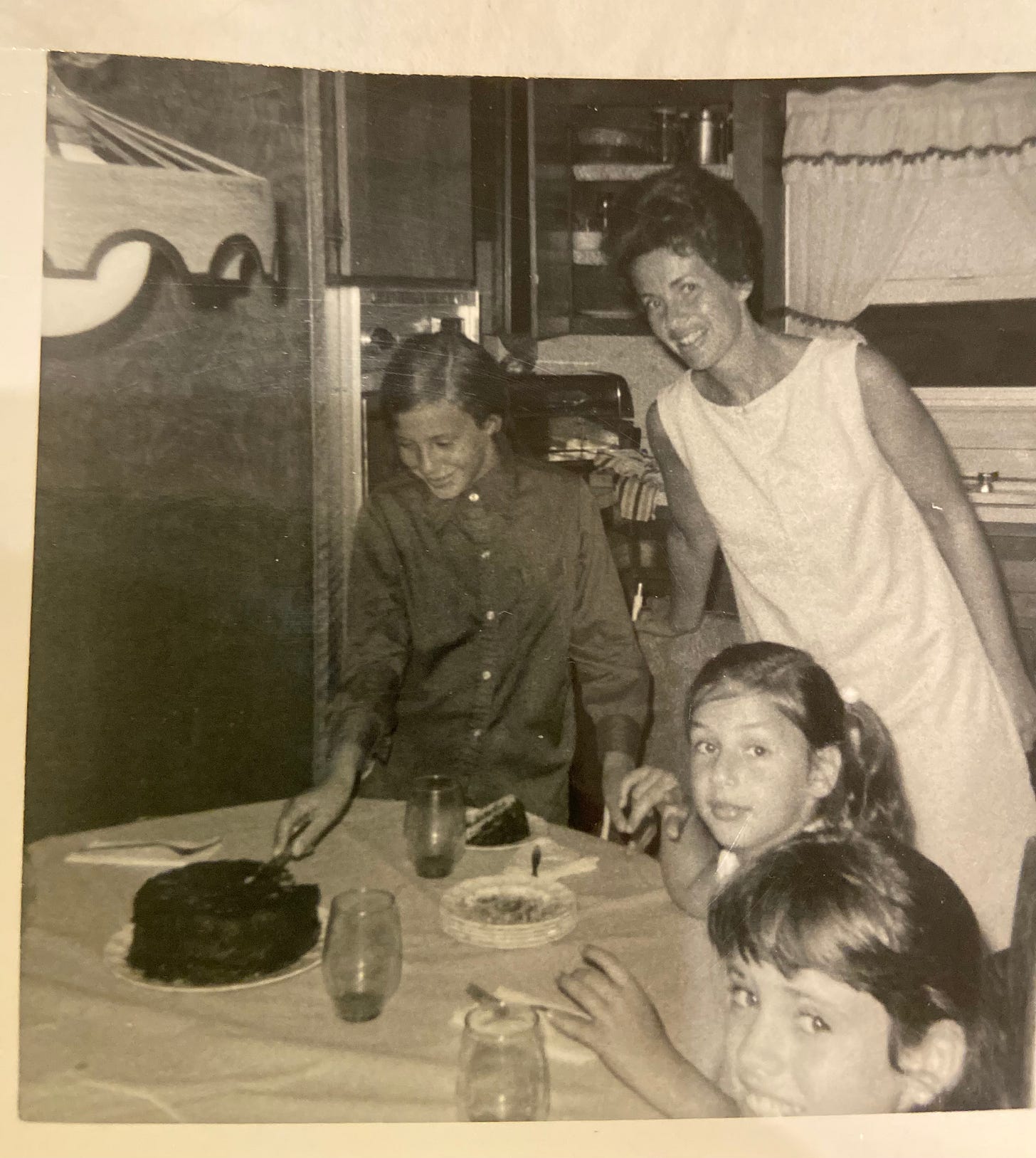

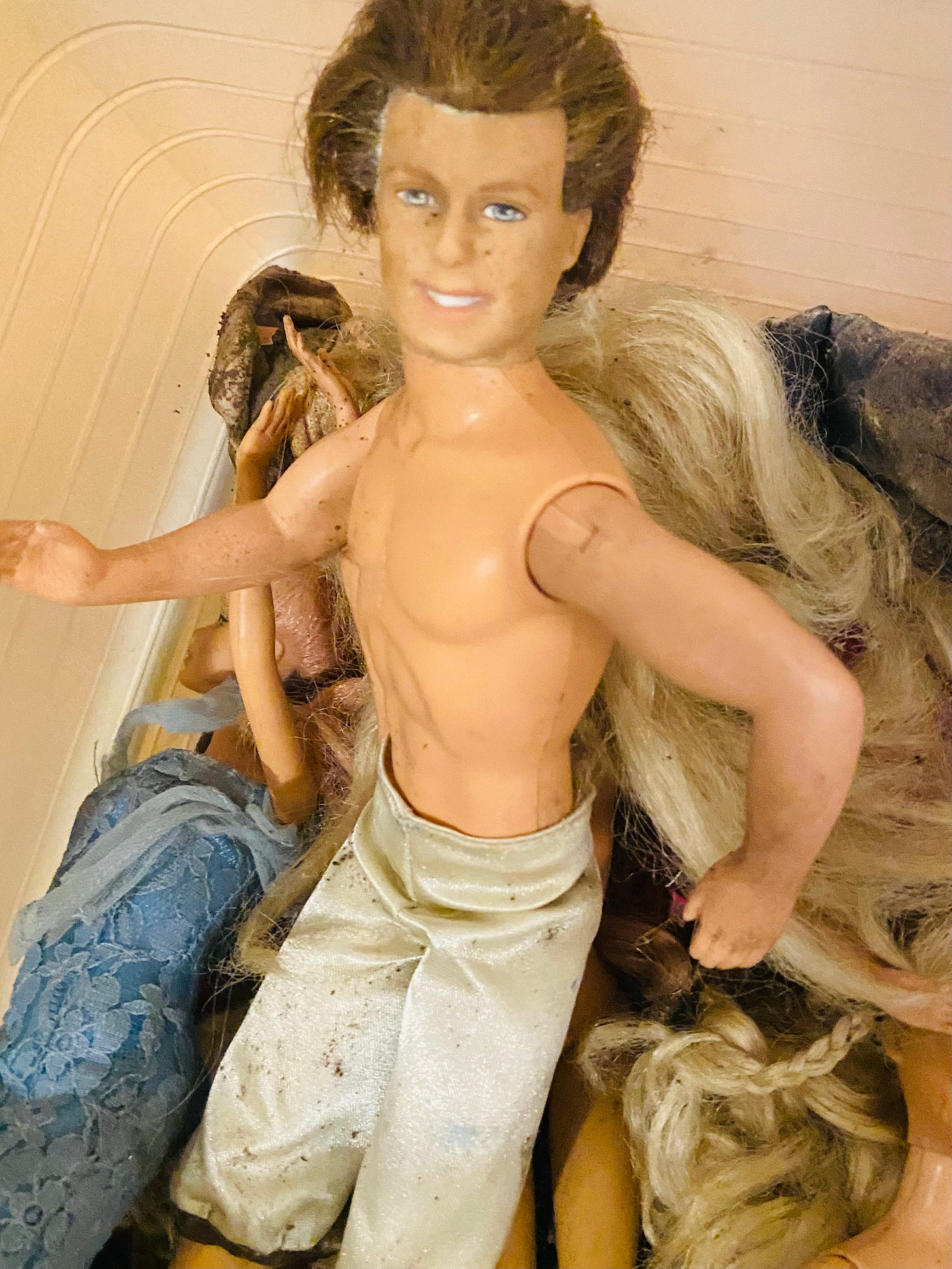
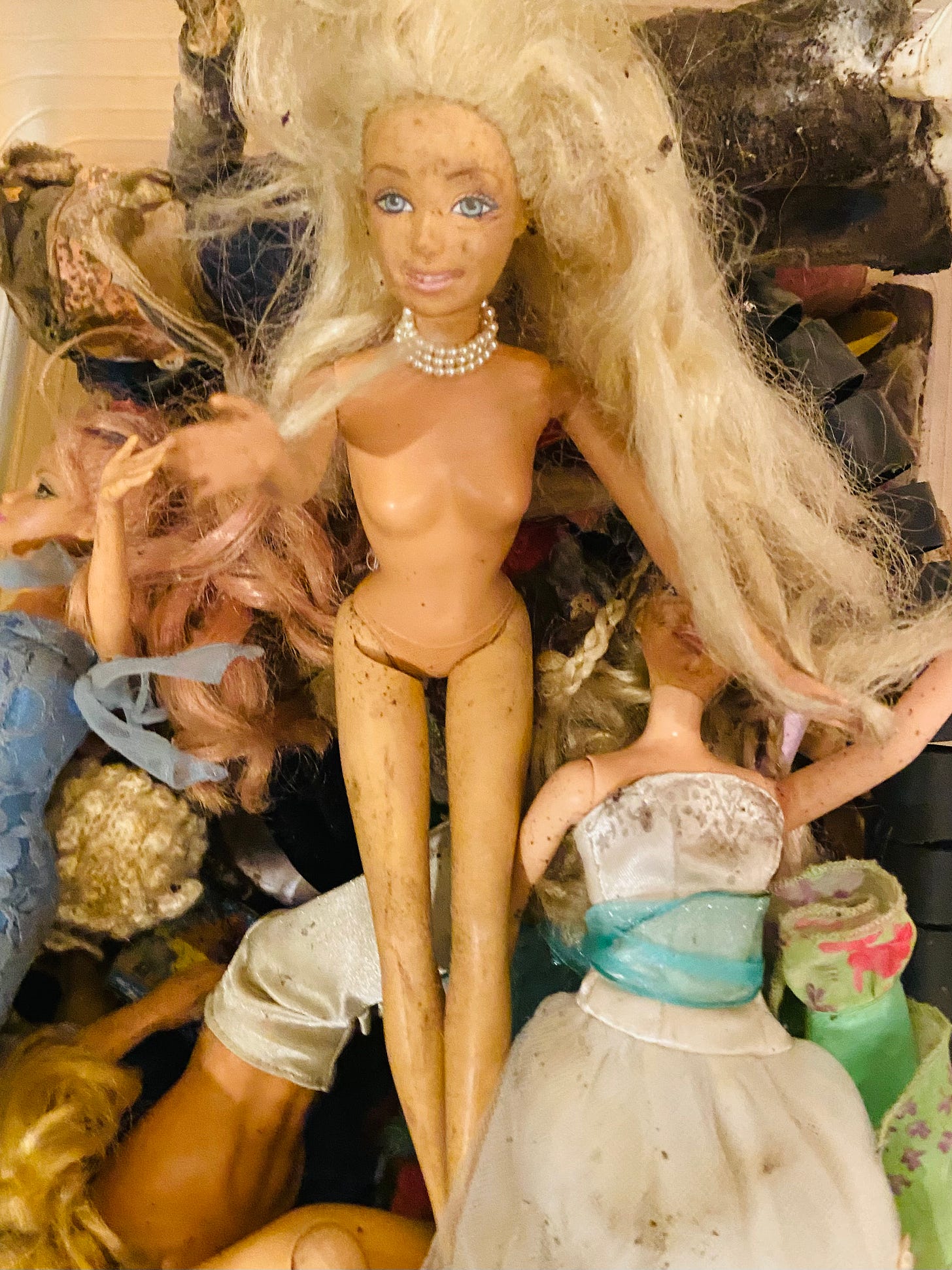
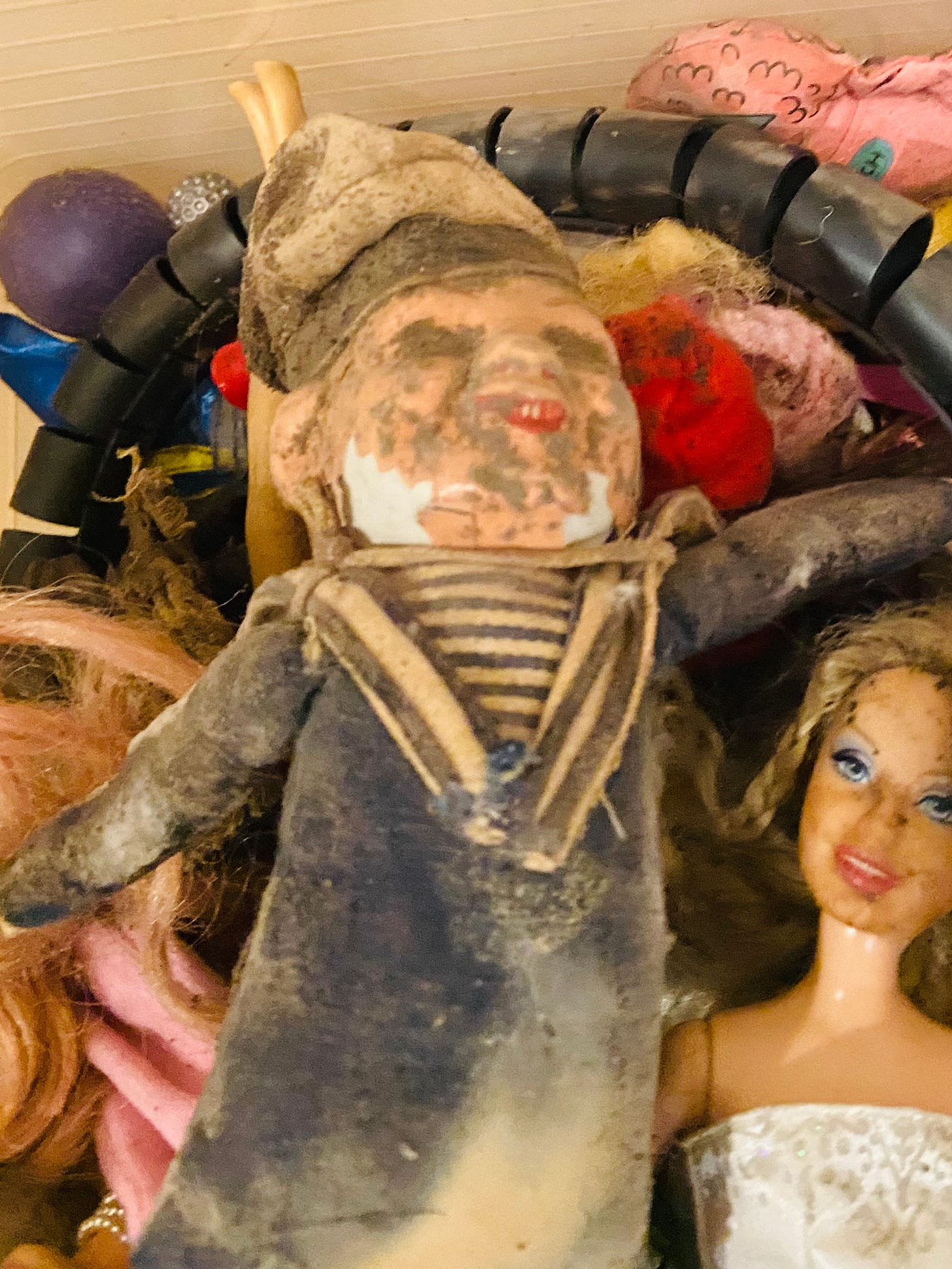

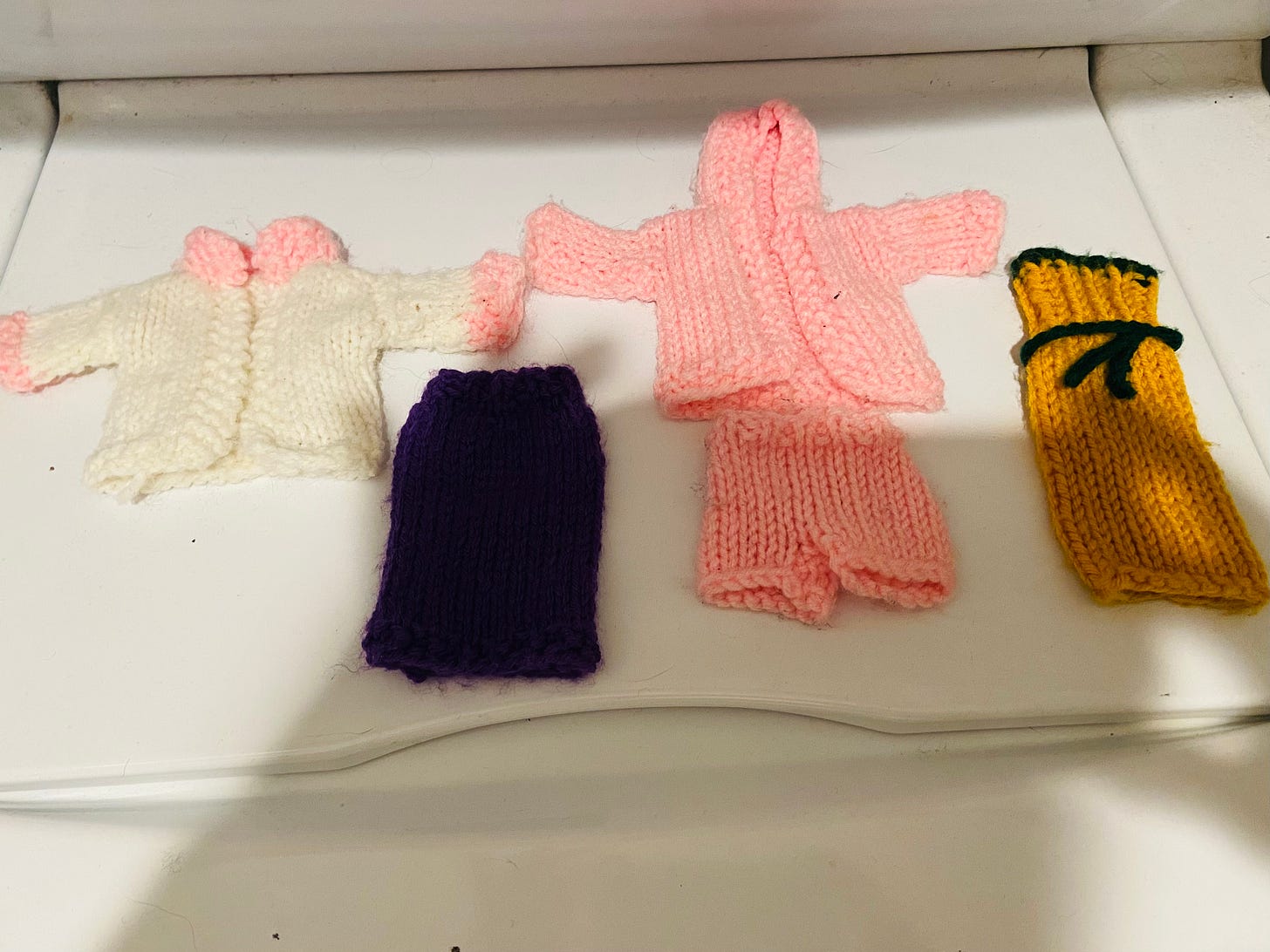


You carry her legacy by your beautiful writing, which is in fact also made by hand. <3
You are forever her daughter and may we all be ‘a little bit scrambled’. Sending love and light. X